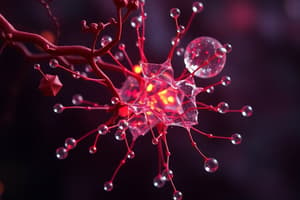Podcast
Questions and Answers
What is the core focus of physics as a branch of science?
What is the core focus of physics as a branch of science?
- Studying matter and energy interactions (correct)
- Exploring celestial objects
- Examining the Earth's composition
- Investigating chemical reactions
Which branch of science focuses on the study of celestial objects like planets and stars?
Which branch of science focuses on the study of celestial objects like planets and stars?
- Physics
- Geology
- Chemistry
- Astronomy (correct)
What does geology primarily study?
What does geology primarily study?
- Chemical reactions
- Properties of matter
- Celestial objects
- Solid Earth and its composition (correct)
Which field of science deals with matter, energy, motion, and their properties?
Which field of science deals with matter, energy, motion, and their properties?
What does chemistry study in relation to matter?
What does chemistry study in relation to matter?
Which field of science investigates processes by which rocks change over time?
Which field of science investigates processes by which rocks change over time?
What is the primary focus of biochemistry?
What is the primary focus of biochemistry?
Which field specifically studies the functions of organ systems in living organisms?
Which field specifically studies the functions of organ systems in living organisms?
What is the main concern of economics as a social science?
What is the main concern of economics as a social science?
Which field specifically studies the interactions among organisms and their physical environment?
Which field specifically studies the interactions among organisms and their physical environment?
What does sociology primarily focus on studying?
What does sociology primarily focus on studying?
Which field specifically studies the history and structure of language?
Which field specifically studies the history and structure of language?
Flashcards are hidden until you start studying
Study Notes
Science
Science is a systematic enterprise that builds knowledge by exploring the natural world through observation and experiment. It involves asking questions, designing experiments to answer those questions, collecting data from those experiments, analyzing the data, drawing conclusions from that analysis, and communicating the results of your study. There are several branches of science that each focus on different aspects of nature:
Physical Sciences
Physical sciences encompasses fields like physics, chemistry, astronomy, geology, and other disciplines concerned with matter, energy, motion, and their properties and interactions. These subjects deal mainly with the non-living world and its laws.
Physics
Physics is the branch of science concerned with the study of matter and energy and their associated forces and behavior. At its core, it's about understanding how the universe works on fundamental levels.
Chemistry
Chemistry is the study of matter and its interactions with energy and matter. It looks at both macroscopic scales and atomic scales to understand properties such as reactions between various compounds.
Astronomy
Astronomy is the scientific study of celestial objects and phenomena, including planets, stars, black holes, galaxies, and cosmic background radiation.
Geology
Geology studies the solid Earth, the rocks of which it is composed, and the processes by which they change over time.
Life Sciences
Life sciences explore living organisms and their interactions with each other and their environment. This includes biochemistry, genetics, physiology, ecology, and medicine.
Biochemistry
Biochemistry is the study of the chemical processes that occur within and around cells, including metabolism and molecular interactions.
Genetics
Genetics is the study of heredity and variation in traits within species.
Physiology
Physiology is the study of the functions of organ systems in living organisms, often focusing on cellular processes or changes within organisms over time.
Ecology
Ecology is the study of interactions among organisms and their physical environment, including relationships between organisms.
Social Sciences
Social sciences investigate the social behaviors and institutions of human societies. They focus on areas like economics, sociology, political science, psychology, anthropology, law, and linguistics.
Economics
Economics is the study of how people allocate scarce resources using various economic models.
Sociology
Sociology is the scientific study of society, human social behavior, and institutions.
Political Science
Political science is the study of government and public affairs, including political theory, public administration, and international relations.
Psychology
Psychology is the scientific study of mental processes and behavior.
Anthropology
Anthropology is the study of humans and human behavior and culture, including social, cultural, and biological aspects.
Law
Law is a system of rules and guidelines that regulate behavior and govern society.
Linguistics
Linguistics is the scientific study of language and its structure, including its history and use.
Science is a process that involves asking questions, finding answers, and then adapting as new information becomes available. It is a diverse field with many branches, each with its own unique focus and methods, but all united by the pursuit of knowledge and understanding of the world around us.
Studying That Suits You
Use AI to generate personalized quizzes and flashcards to suit your learning preferences.




